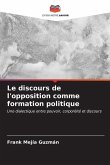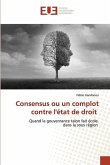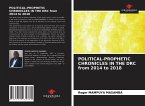Empathy with the discourse of political opposition is not a condition of the will, as one might think, but rather the necessary result of a complex web of devices and circumstances that complexify the political subject.Power, the body and discourse are the key elements that underlie the mechanics of political opposition in an attempt to train the naïve and uncritical subject necessary to swell a contradictory, belligerent collective in perpetuity. A power that occurs insofar as it is granted and perceived by the other in a reciprocal and divergent relationship. A body that is embodied as a consequence of a social scaffolding in constant mutability, but in accordance with the reality that gives rise to it. An intentional and sophistic discourse in search of the conformation of a homogenised social mass that assimilates this rhetoric as a paradigm. A whole permanent dynamic of instruction so that the common citizen, naïve and without a dialectical approach to everyday life, ends upbecoming a staunch, violent and belligerent opponent who, in turn, strengthens a polarised, rivalrous and constantly socially threatening mode of nationhood.
Bitte wählen Sie Ihr Anliegen aus.
Rechnungen
Retourenschein anfordern
Bestellstatus
Storno








